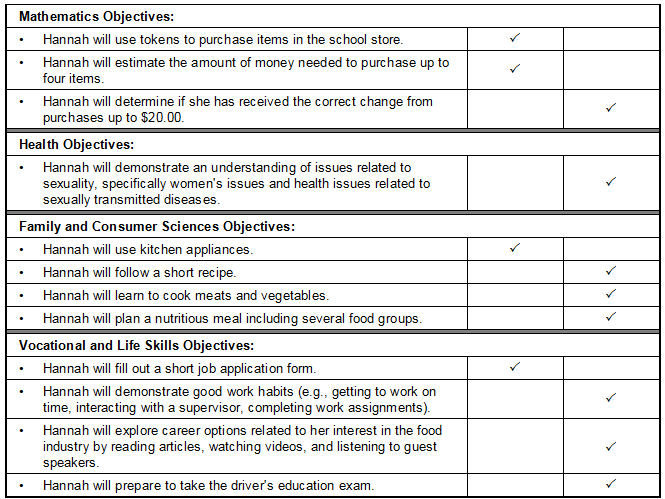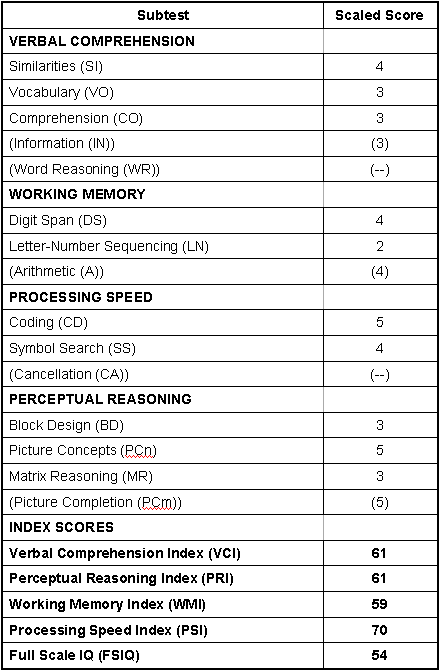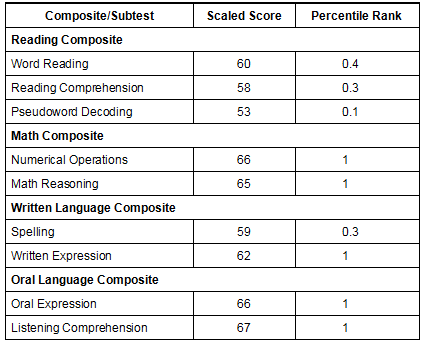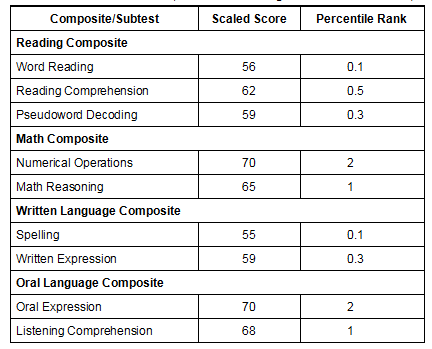Study Guide
Field 042: School Psychologist
Sample Multiple-Choice Questions
Competency 0004
Understand how to select, adapt, and develop assessments that provide accurate,
useful information for determining appropriate interventions and making educational
recommendations for students with diverse strengths and needs.
A second-grade teacher is consulting with a school psychologist about a student's negative classroom behaviors. The psychologist begins by having the teacher describe the student's negative behaviors and identify one specific problem behavior that seems most pressing. The teacher cites the student's physical aggressiveness toward peers as the most urgent problem to address. According to the behavioral consultation model, after identifying this target behavior, the psychologist's next step should be to:
- brainstorm with the teacher alternative strategies that may be used in the classroom to decrease the target behavior.
- establish student performance goals that will be used to determine the success of any plan developed to decrease the target behavior.
- share with the teacher information about environmental factors that are typically associated with the target behavior.
- assess the current frequency, duration, and intensity of the target behavior and the conditions under which it occurs.
- Answer
- Correct Response: D. In behavioral consultation, a school psychologist works with a consultee in a collaborative problem-solving process designed to analyze a behavior-related student problem and create and implement an effective plan to resolve the problem. A standard series of steps is used to structure this problem-solving process. In this series of steps, after the psychologist and the consultee identify a target behavior that needs to be addressed, they define the basic characteristics of the target behavior (including its frequency, duration, and intensity) and identify the environmental factors that tend to occur in conjunction with the target behavior.
Competency 0008
Understand prevention and intervention techniques and resources for addressing individual,
group, and schoolwide needs.
A school psychologist is providing individual counseling to Jana, a seventh grader who has been experiencing depression. During one counseling session, Jana confides that verbal and physical violence between adults in her household is a frequent occurrence. After addressing the student's safety, the psychologist's most important priority in responding to this situation should be to:
- help Jana define strategies she can use to ensure her own well-being when violence occurs at home.
- enhance Jana's awareness of relationships between depression and violence in the home.
- teach Jana strategies for problem solving and conflict resolution that she can apply in situations at home.
- help Jana's family recognize potential consequences of their behavior on Jana's mental health.
- Answer
-
Correct Response: A.
One of the main goals of individual counseling in the school is to help alleviate students' emotional distress. In the situation described, the student must cope with a stressful home environment that includes frequent violence between adults. Typically, a school psychologist in such a situation is unable to exert any direct control over the behavior of adults in a student's household. Therefore, the school psychologist's first priority should be to help the student find ways to cope with her home environment and minimize its adverse emotional consequences. This can best be accomplished by prompting the student to identify and use behaviors that enable her to take care of herself when violent situations arise.
Competency 0009
Understand research methods, program evaluation, and principles of data-based decision
making and accountability.
A school committee has requested data to justify providing continued funding for an early intervention program for students with autism at one of the district's elementary schools. In response, the principal of the school asks the school psychologist to gather information on the academic success of students with autism in the language arts and mathematics curricula. Which of the following research designs would likely be the most effective in providing this information?
- a study of an individual sixth-grade student with autism who has participated in the early intervention program
- a study of a randomly selected group of sixth-grade students with autism in the school district
- a study of all students with autism currently enrolled in the early intervention program
- a study of all elementary school students with autism within the school district
- Answer
-
Correct Response: D.
By collecting data from all of the district's elementary school students with autism, the school psychologist will be able to compare the academic success of students who have participated in the early intervention program with that of students who have not participated in the program. This research design allows data to be easily collected and analyzed in response to the school committee's inquiry. The design also reflects both internal and external validity in providing support for the early intervention program.
Competency 0011
Understand the roles and responsibilities of school psychologists.
District administrators ask a school psychologist to play a lead role in developing a crisis intervention plan for school-level personnel to use in the event of a tragedy (e.g., a student death) at a district school. The psychologist should be aware that a primary goal of this type of plan should be to ensure that:
- the burden of crisis response is shared equally among the staff members at a school.
- key responsibilities for crisis management are defined and assigned to specific people.
- all members of a school community receive an equal level of assistance and support during a crisis.
- any tragedy that may occur will cause minimal disruption to the school schedules and routines.
- Answer
-
Correct Response: B.
Crisis intervention plans are created to establish crisis management procedures that support effective management and coping behaviors in response to a crisis event. A key component of a school crisis intervention plan is to specify a crisis team whose members are able to provide a range of services and who understand what their roles will be and what their responsibilities will include in time of crisis. Inclusion of this component helps ensure a rapid, well-organized response to school crises.
Use the information below to answer the questions that follow.
CASE FILE FOR HANNAH
Hannah is a high school student who is 14 years, 10 months old and has a cognitive disability. She receives support from a special education teacher in a general classroom for mathematics, health, and family and consumer sciences, as well as individual and small-group instruction in a self-contained special education classroom focusing on vocational and life skills. Mr. Sorenson, the school psychologist, is conducting Hannah's scheduled reevaluation. It is also time to plan for her postsecondary transition. Use the information, shown below, from Mr. Sorenson's case file on Hannah to answer the six questions that follow.
Excerpt from Hannah's current Individualized Education Program (IEP):

Hannah's current scores on the Wechsler Intelligence Scale for Children—Fourth Edition (WISC–IV) (administered by Mr. Sorenson):

Hannah's scores on the Wechsler Individual Achievement Test—Second Edition (WIAT–II) (administered during a routine reevaluation three years ago):

Hannah's scores on the WIAT–II (administered during her current reevaluation):

Hannah's scores on the Vineland Adaptive Behavior Scale—Interview Edition (administered during her current reevaluation):

Comments from Hannah's special education teacher:
Summarize student's academic progress:
Hannah has shown excellent progress in her math and family and consumer sciences classes and will most likely meet all her IEP objectives in those subjects within the next month. Her only problem is that she often has unrealistic goals and expectations. For example, Hannah turns 16 next school year and she has told me she wants to get her driver's license. She is convinced she will pass the license test on the first try, but she is having trouble understanding the material she must master to pass the test, and achieving that goal may be beyond her capabilities.Hannah has also stated that her career goal is to become a chef in a fancy restaurant. She loves family and consumer sciences class and cooking at home with her mother. Hannah's career goal may also be beyond her capabilities, however.
Discuss behavior concerns you have for this student:
Hannah has been having difficulty interacting with her peers. She tries to hug everyone, which makes other students uncomfortable. She also misinterprets teasing by boys as an indication that they want to be her boyfriend. If I suggest that her behavior is inappropriate, Hannah gets very upset, occasionally even yelling and running out of the room. She has been working on this in counseling, and I feel that she is making progress.Excerpt from Mr. Sorenson's notes on Hannah's case:
After talking with Hannah's special education teacher, it seems that it would be a good idea for her to begin an internship as a cook's assistant at the school snack bar. Include this recommendation in her assessment report.
Competency 0011
Understand the roles and responsibilities of school psychologists.
CASE FILE FOR HANNAH
Mr. Sorenson reviews the comments by the special education teacher about Hannah's
inappropriate behavior with her peers. He also discusses this problem with Hannah's
special education teacher. Both the teacher and Mr. Sorenson agree that Hannah needs
assistance to improve her ability to interact more effectively with her peers and
with others. Which of the following is the most appropriate role for Mr. Sorenson
to play in helping Hannah in this area?
- At the multidisciplinary team meeting, Mr. Sorenson should recommend a set of strategies the special education teacher can use to teach Hannah to interact more appropriately with her peers.
- Mr. Sorenson should work with the multidisciplinary team to develop IEP objectives addressing specific skills that will enable Hannah to interact more appropriately with others.
- Mr. Sorenson should refer Hannah to a private therapist for help in overcoming emotional problems that may be negatively influencing her peer interactions.
- Mr. Sorenson should work with Hannah in the special education classroom, applying different behavior-modification techniques to assess which ones would be most effective to use with her.
- Answer
-
Correct Response: B.
By working with the multidisciplinary team, Mr. Sorenson can ensure that the strategies to be used to help Hannah develop her social skills will be designed as achievable goals and objectives. The IEP objectives can also specify that a variety of settings be used in the development of these skills to maximize the likelihood that new behaviors will be generalized. Most importantly, including these learning objectives on the IEP ensures that they will be monitored and evaluated regularly.
Competency 0001
Understand human development and behavior.
CASE FILE FOR HANNAH
Mr. Sorenson is preparing specific recommendations for Hannah's transition team
concerning her social skills. Which of the following would likely be the most effective
way to promote Hannah's appropriate social interactions in the workplace?
- Instruct Hannah during school counseling sessions on appropriate social skills to use at work.
- Arrange for Hannah to shadow a peer who has an after-school job to observe appropriate social skills.
- Reward Hannah with extra time in her family and consumer sciences class whenever she uses appropriate social interactions during the school day.
- Take Hannah into the school snack bar where she will be interning and role-play appropriate social skills with her.
- Answer
-
Correct Response: D.
The strategy of using role-playing is particularly effective for social skills training. Since Hannah's behavior is inappropriate in specific situations, she would benefit from having the opportunity to learn and use appropriate work-related social skills within the setting in which she will use these skills. At the same time, she will be able to receive feedback and positive support from Mr. Sorenson and others who will role-play with her.
Competency 0006
Understand how to interpret assessment results to increase knowledge about students'
individual strengths and needs.
CASE FILE FOR HANNAH
Which of the following conclusions about Hannah's learning is best supported by
her scores on the Wechsler Individual Achievement Test—Second Edition (WIAT–II)?
- Hannah's achievement level has remained relatively constant over the past three years.
- Hannah has been making steady progress in her overall learning during the past three years.
- Hannah has made some learning progress, but her IEP goals are not challenging enough to encourage her to work to her full potential.
- Compared to her progress in other subject areas, Hannah has made little or no progress in written language skills.
- Answer
-
Correct Response: A.
The scores reported in both administrations of the WIAT–II indicate that Hannah's achievement level has remained relatively constant. Percentile ranks indicate how an individual examinee performed in comparison to a normative sample—a group of examinees who took the test previously and whose scores are used as a standard against which other examinees are measured. For example, Hannah earned a percentile rank score of 1 on both administrations of the Math Reasoning subtest, indicating that over time she maintained her achievement consistently, scoring as well as or better than 1 percent of the normative sample on both administrations.
Competency 0006
Understand how to interpret assessment results to increase knowledge about students'
individual strengths and needs.
CASE FILE FOR HANNAH
Hannah's scores on the Wechsler Intelligence Scale for Children—Fourth Edition
(WISC–IV) indicate that her Full Scale IQ falls within the:
- Average range of intellectual functioning.
- Low Average range of intellectual functioning.
- Borderline range of intellectual functioning.
- Extremely Low range of intellectual functioning.
- Answer
-
Correct Response: D.
The WISC–IV has numerical limits assigned to descriptive categories of intelligence levels. Full Scale IQ scores ranging from 69 and below along with deficits in adaptive behavior indicate intellectual functioning within the Extremely Low range.
Competency 0007
Understand how to use assessment information within the multidisciplinary team process
to make recommendations and develop interventions that respond to students' identified
educational and mental health needs and enhance students' educational functioning.
CASE FILE FOR HANNAH
It is most important for Hannah's Plan for the postsecondary transition services section of Hannah's IEP to:
- consider all aspects of Hannah's life and include strategies and objectives to help prepare her for a full life outside of school.
- concentrate on developing vocational skills Hannah will need to get a job that is suited to her abilities.
- designate which community service agencies will be responsible for providing support services to Hannah after she graduates.
- contain a detailed list of the requirements Hannah must fulfill to be eligible to graduate.
- Answer
-
Correct Response: A.
As a student moves to life beyond the structure of school, many additional demands for problem-solving, decision-making, and initiating activities will be placed on the student, along with the need to deal with financial, transportation, and employment issues. Therefore, it is imperative when planning for Hannah's post-school transition to target specific skill areas for instruction and to provide for all necessary support systems prior to her leaving school.
Competency 0003
Understand curricula and instruction that promote learning, achievement, and competence
in students with diverse strengths and needs.
CASE FILE FOR HANNAH
Mr. Sorenson and Hannah's special education teacher are considering Mr. Sorenson's
idea that Hannah participate in an internship as a cook's assistant at the school's
snack bar. The most important advantage of this strategy for Hannah is that such
an internship would:
- provide her with opportunities to interact socially with peers.
- allow her to use money concepts and skills.
- allow her to gain work experience and skills in a meaningful context.
- prompt her to lower her personal expectations before leaving the school setting.
- Answer
-
Correct Response: C.
Service delivery to adolescents with mild cognitive impairments is particularly effective when instruction, training, and application of skills can occur in a natural setting rather than in a classroom. This is particularly helpful when the student's interests and aptitudes are matched with the functional skills on which the student is working. Additionally, this strategy provides the student with the opportunity to generalize skills to the workplace setting.